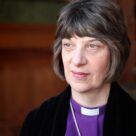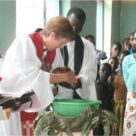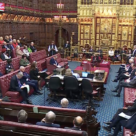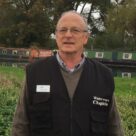‘The spirit of the Lord God is upon me because the Lord has anointed me’ – So began our Old Testament reading from the prophet Isaiah (Isaiah 61:1). Words then read by Jesus in the synagogue hundreds of years later. With the eyes of all in the synagogue fixed on him, Jesus proclaims, ‘Today this scripture has been fulfilled in your hearing.’ (Luke 4:21)
I suspect every person here wants to join in with God’s transforming kingdom of God work. And once again, thank you for the privilege of sharing in ministry together. As followers of Jesus Christ, we long to bring good news to the poor, to proclaim release to the captives and recovery of sight to the blind. We long to let the oppressed go free.
.. And I see the signs of faithfulness to that as I spend time with different people in different places and contexts across this diocese, and as I hear the stories of lives and communities. Thank you. None of those stories are small, however they sometimes seem to you. They are about your faithfulness to Christ as individuals and communities as we share in LIFE Together: Our Vision – Diocese of Gloucester
In our Gospel reading I was struck by the verse which simply says, ‘The eyes of all in the synagogue were fixed on him’ (Luke 4:20) – Fixed on Jesus Christ. Of course that was for many different reasons, but for us those words seem pertinent.
Of course, our eyes and ears hear and see many things. There is all the stuff of our own lives, with joy or struggle. And amid the world’s beauty we also see so much sadness, injustice, pain, oppression, whether close to home or far away. And fixing our eyes on Jesus is not about avoiding all that – we need to sit with it and not run from it.
In the Church of England at present, fixing our eyes on Jesus is not about denying the brokenness and pain, not least the failures in relation to those with lived experience of abuse; or our failures in our culture and structures that are sometimes far from good news. We need to sit with it and not run from it – and tomorrow we will do just that as we sit at the foot of the cross, fixing our eyes on Christ.
The eyes of all in the synagogue were fixed on him.
As we gather here I am acutely aware of so many pressures and concerns in your different contexts – including buildings, parish share; finding officeholders; funding for chaplaincy; the pressures on schools; the weight of administration; the sense of being let down by bishops and archbishops when locally everyone is working so hard at safeguarding. And of course, the pressure placed upon clergy and lay leaders due to the high number of vacancies; and we still have much to learn in how we live shared ordained and lay leadership.
Yet, in all this, I am greatly encouraged by so much that is being lived in your different contexts across the diocese; and by much which is emerging from the deanery strategic thinking as new pathways are being shaped, some of it quite innovative such as deanery operational hubs. I am excited by what is growing among children, young people and families, including our schools, the ministry of connectors, and sportily….
But…But … the danger is that anxiety and uncertainty continually push us to the place of ‘what’ and ‘how’, and we lose sight of the ‘why’. Our starting place must be to lift our eyes to the glory and mystery of God, and dare to imaginatively paint what kingdom-of-God transformation might look like in our local communities and contexts, and in our country and in our world. What might it look like if good news is received and lived by those impoverished in so many different ways? What might it look like if all those who are oppressed are freed? or those of all ages and backgrounds who are held captive by so many things, experienced release?
Even if we had all the clergy and lay leaders we dream of; even if we had all our buildings fixed and paid for; if we had more giving than is required to cover parish share, more funding for chaplaincy … My question would still be ‘so what’ and why?
It is my daily prayer that we keep before us that vision of what kingdom of God transformation might look like, keeping our eyes fixed on Jesus as we humbly but boldly take those next steps to walk in that direction, even if those next steps are about clearing the path first; and never forgetting this is God’s work and the weight of the bringing in of the kingdom is not on our shoulders. God is doing it and God will do it. One day all will be made new (Rev 21:1-5).
Those who are ordained will remember those words spoken to us: ‘You cannot bear the weight of this calling in your own strength, but only by the grace and power of God’. and then came the words, ‘Pray therefore that your heart may daily be enlarged, and your understanding of the Scriptures enlightened…. Pray earnestly for the gift of the Holy Spirit’ (words from the ordination service).
In the Collect today, we prayed that we would be anointed with the Holy Spirit so that we might join in and bear witness to the Gospel of salvation, but we first acknowledged that it is Jesus Christ who was anointed with the Holy Spirit and with power, to bring to the world the blessings of God’s kingdom. And when we soon pray the Lord’s Prayer we will declare that God’s is ‘the kingdom, the power and the glory’.
Over the past few months, as we have watched all that is happening across our world, and as we have been broken and shocked as the Church of England, power has been something of a negatively-loaded word. It has been about the abuse of power, or an expected deference, or an arrogance in leadership which sees some people and countries as greater than others. Power is a word often associated with oppression, and a word which can evoke fear. So, perhaps we have consciously or subconsciously rejected the concept of power completely, and perhaps shunned the power bestowed upon us in our different callings, only ever to be used for the wellbeing of all people and places, and to the glory of God. A power at work within us through the work of the Holy Spirit, calling us (in our strengths and our weaknesses) to take up the authority amazingly entrusted to us, and then to choose to kneel and wash feet – confidently, humbly and unapologetically. It is not about shunning power but about being willing to inhabit it appropriately – To receive God’s power with courage and humility that we might join in with the kingdom work of Jesus Christ.
In that scene in the synagogue we see Jesus, the Christ, setting out a powerful kingdom vision reflected in those words of the visionary prophet Isaiah. And it is all about who Christ is and who the Church is to be, but only by the grace and power of God.
If we continue on in Luke’s gospel just a few chapters, we encounter Jesus asking his disciples ‘who do people say that I am’, and they begin to tell him what others are saying, and Jesus says to them, ‘But who do you say that I am?’ and it is Peter who dares to answer, ‘The Messiah of God’ (Luke 9:18-20).
Yet, it is Peter who will soon deny even knowing Jesus. But then when the remorseful Peter encounters the risen Christ, it is Peter who is told by Christ to feed his sheep; and the building of Christ’s Church is entrusted to him with power.
Perhaps at that point, a key question on Peter’s heart and mind is ‘Who do you say I am Jesus?’.
As we look deep within ourselves as deacons, priests, bishops, lay leaders, and all of us as disciples of Christ, recognising who Jesus is and longing to participate in living and sharing Christ’s life in all its fullness (bringing good news to the poor, enabling the oppressed to go free, bringing sight to the blind), we know our failings, our self-doubt, our weariness, our denying of Christ. We know how we are when we are overwhelmed, criticised, rocked … And perhaps a hidden question deep within ourselves is wondering who Jesus says we are. God who knows our stories, our brokenness, our desires and fears, our goodness and our failings; ‘God, who knows me inside out, who do you say I am, Jesus? and ‘who do you say we are together as the Church?’
Perhaps we don’t really want to hear the answer because perhaps we don’t really trust in the power of God’s merciful love.
Interestingly in our Scripture readings the only word that is translated as ‘love’ is in the context of God’s love of justice. In my role as Bishop to Prisons, I am acutely aware of how closely we align justice and punishment, yet God who is all powerful and who IS love, mysteriously holds justice with mercy.
I am sure that for those in the synagogue fixing their eyes on Jesus, there is a sense of incredulity because as Jesus quotes from Isaiah he stops short of mentioning the day of vengeance of God.
Today, we have spoken and sung of God’s power and God’s justice and love, and we have sought and received God’s forgiveness and mercy. Yet I wonder if we have really received it and believed it?
Today may we offer ourselves afresh as who we are, and open our hearts to receive the power of God’s love, full of mercy and grace. As we walk towards the cross and beyond to the empty tomb, may we recommit ourselves to joining in with the transforming work of God revealed in Jesus Christ.
As we are fed by Christ in bread and wine may we seek a fresh anointing of the Holy Spirit, praying for the power of God to be at work within us and through us as we lift our eyes to the vision of the kingdom of God, and only then shape and live the ‘what’ and the ‘how’. Let us take up that power to live the authority given us with humility and hope…keeping our eyes fixed on Jesus Christ.
Thank you again for the ministry in which we share. AMEN
Watch the livestream of the service below.
Photos:





















